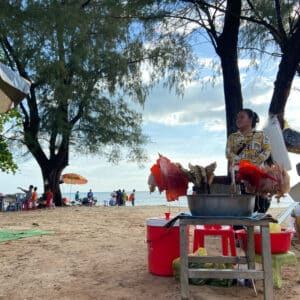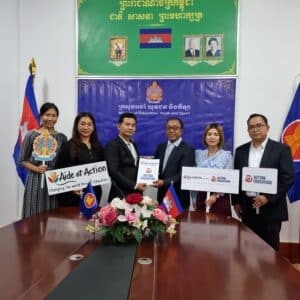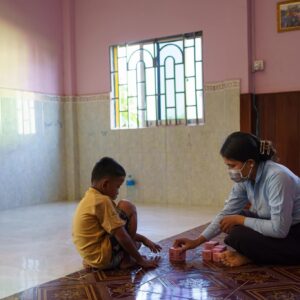In Siem Reap province, home to Cambodia’s famed Angkor temples, Covid-19 has had a devastating impact on families as those who once relied on tourism struggle to provide for their families. Among them is 54-year-old Thong Teuy who despite needing to borrow rice from neighbours to survive, is not letting go of her commitment to give her daughter a quality education.
In a country where one in two children with disabilities is not in school, Teuy knows the value of education for her daughter who was born with down syndrome. When Srey Theav was six years old, her mother tried to register her at public school but she was denied because the school principal said he didn’t have the resources and his teachers didn’t know the methodologies to teach a child with disabilities.

But, Teuy, never gave up. Ten years later, Teuy found a school suitable for her daughter – a public school with dedicated teachers and classroom for children with disabilities supported by Rabbit School Organisation and Aide et Action under The Cambodian Consortium for Out of School Children.
The Consortium, in partnership with Educate a Child, a global programme of the Education Above All Foundation, seeks to enroll over 116,000 out of school children in school over the next four years.
Since starting school, Srey Theav has learned how to read and write. This was the first big change her mother noticed. Other things she’s learned include her ability to communicate better. “She’s become more respectful of others, especially me”, laughs Teuy, delighting in her daughter’s progress. “She’s learned how to follow instructions, to greet others and how to do simple chores at home like washing the dishes, washing clothes and other housework.
Srey Theav’s teacher Seiha has also noticed these changes. When she first started school, it was difficult to understand her” explains Seiha. “She couldn’t understand others well either but now that has really changed and she communicates clearly.”
During Covid school closures in 2020, Seiha came to teach Srey Theav’s at home, teaching her for one hour, twice a week, in a bid to keep her social skills and basic knowledge up. While educational programs have been broadcast on TV, online and on radio during school closures, specific content tailored for children with disabilities and their caregivers has been hard to come by.
While Aide et Action and Rabbit School Organisation have created content to address this gap, access to technology remains out of reach for children from poor households like Srey Theav. Having committed teachers like Seiha who are fully supported to develop their skills and adapt to the changing needs of their students during Covid-19 is vital to ensure the continuity of education for children with disabilities.
The economic impact of Covid-19, is being felt in the household too as Teuy struggles to provide for her family due to the restrictions on travel and trade.
“It’s hard to survive because I lost my jobs and the prices of rice and food increased and my daughter eats a lot,” explains Teuy, still smiling. Sometimes I borrowed rice from my neighbours or took a loan from the shop. Every day has been a struggle since Covid.”

When Srey Theav isn’t studying, she helps her mother with household chores such as cleaning and cooking. Teuy hopes that between what she learns at home and what she learns at school, her daughter might be able to get a job washing dishes or clothes in the future and be able to support herself somewhat.
As the current Covid-19 crisis presents the largest education emergency of our time, our aim is to also ensure continuity of education during school closures to ensure marginalized children like Srey Theav do not get left behind and can take more ownership over their futures.






